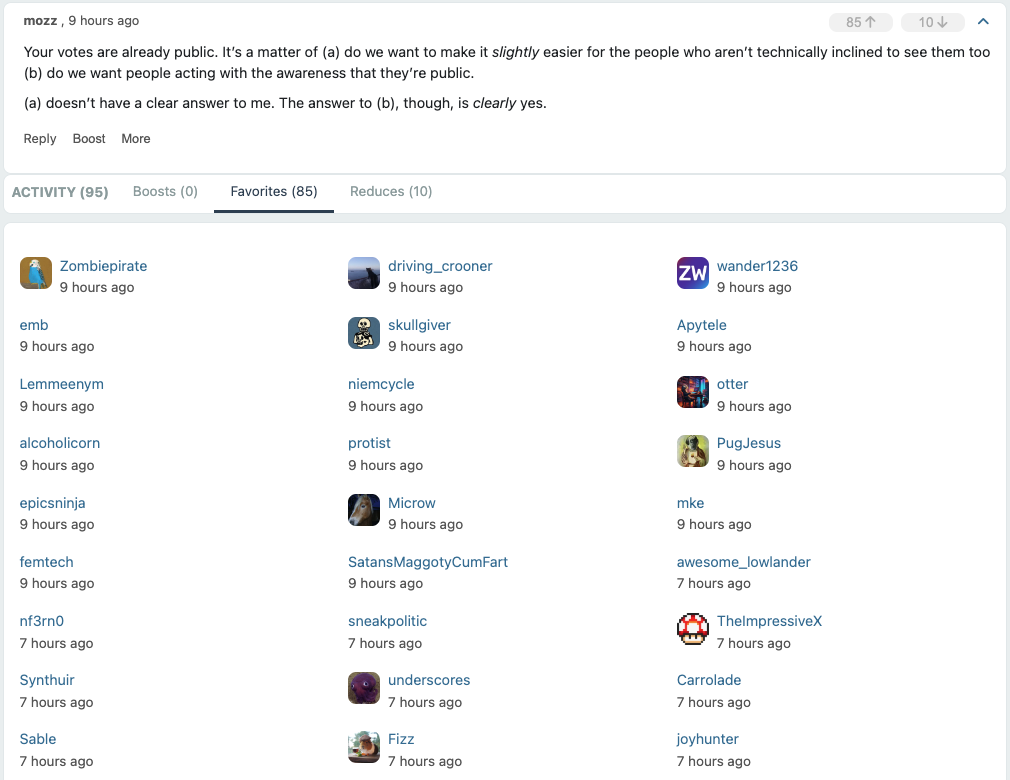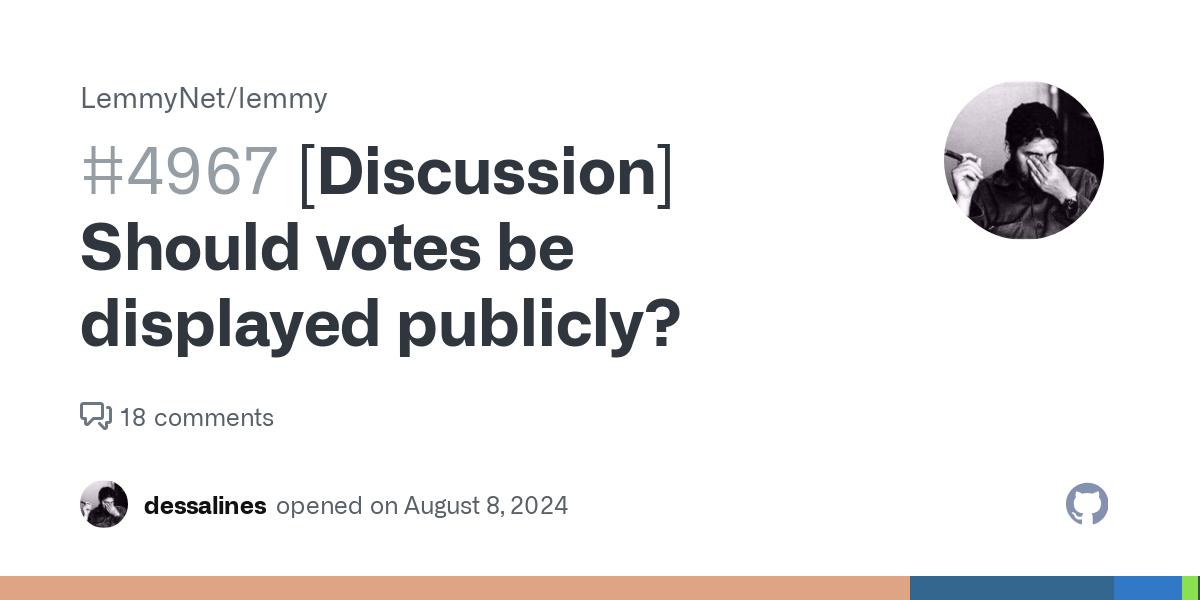Probably better to post in the github issue rather than replying here.
Hard no from me
I don’t want some nutjob with too much time stalking me because I upvoted something about climate change or downvoted some bigoted shit. We all know those fuckos are out there
Voting on Reddit-like platforms is soft moderation by a community, and if you disincentive that, the whole model kinda falls apart IMO
Your votes are already public. It’s a matter of (a) do we want to make it slightly easier for the people who aren’t technically inclined to see them too (b) do we want people acting with the awareness that they’re public.
(a) doesn’t have a clear answer to me. The answer to (b), though, is clearly yes.
Your votes are already public.
People say this all the time, but it’s not really the case.
I don’t think privacy is a binary thing that one either has or does not - there are degrees of privacy. Currently what we have is mostly private, requiring either technical skill or admin access to circumvent. This is a pretty high bar which 99% of people would not be able to reach. You’re proposing removing the bar entirely because it is not high enough.
Removed by mod
They’d get defederated.
Removed by mod
Ok, yeah, theoretically.
But we’re talking about putting voting info into the UI for anyone to see. Not highly motivated and skilled bad actors.
Removed by mod
It’s in the mbin ui already
It’s not quite that simple. As far as I’m aware, it’s difficult to fetch from another instance “after the fact” what all the votes are for a particular user or comment; you have to be signed up to receive updates on it, and then after the fact you can go hunting around in your own instance’s DB and see what all the votes were (or your UI can do it, if it’s supported).
But, yes, there are instance softwares that will do it, and no one’s defederating from every one of those instances (nor I think should they). Someone posted a link to an mbin instance breaking down the votes for this post. Votes are not private.
Removed by mod
How do you know who you’re defederating with? When I set up my instance, the list of federated instances was thousands. How do you know which one is scraping the data?
How is the data public? I’m asking in the most technical sense?
This informs an issue I’ve had lately with a group of three people or bots following along my comment chain (All my comments, for a while, were dropping consistently to -2 score in all contexts).
It’s my understanding that votes are not public. Am I wrong?
Removed by mod
All votes are public, they’re literally broadcast to the Fediverse writ large. You vote on something on your server, your server then tells the server owning the thing you voted on and that server then tells anyone who is interested (subscribers on other servers). That way everyone knows that this comment was voted on, but that information is indelibly tied to you - an entity on the Fediverse.
Lemmy devs just chose not to a) show that information in a UI (plenty of other software out there does) and b) not inform people that was the case. Which leads to the whole point of the thread, hiding this from users merely gives a false sense of security.
Your idea of a nice world and mine are very different.
Removed by mod
Your world does not correspond to reality given that mbin already shows individual votes.
Head over to your comment on fedia.io and see who voted on your own comment.
Do you want to only vote on instances that defederate all mbin instances, and commit to keep doing so in the future?
Just because people can go out of their way to find this information, doesn’t mean we should remove all restrictions. That’s a real twisted way of thinking.
What we have in place is already egregious imo, and a major flaw with the system in place.
That isn’t really going out of your way, it is the base mode of how the fediverse works. Looking at something on a different instance.
Plenty of people just use mbin and see this, without any action at all.
The point is that as it stands right now, there are already basically no restrictions. The only thing perhaps missing is the knowledge that you can simply copy paste a link into fedia or another mbin instance to view upvotes.You can open an issue on mbin about it, to restore a semblance of restriction. But currently as it stands, all restrictions are about as fallen as they could be.
You can ofc argue that we shouldn’t open another equivalent hole in lemmys webui and api, so that you can in the future remove the ability from mbin.
I would in turn argue that this system has always been egregious, and that in the same sense as banning encryption you never hit those you want to hit using incomplete restrictions. Regular users are led to believe their votes are private, while the worst dataminers or trolls will always have their instances to query all of that info.
And how could you inform people that their votes are public without at the same time telling them how to get access to that info?If mbin removes the info, you will get another fediverse software showing it. You will get fediverse activity pub log info pages, specific vote info pages, it will never end.
Has reddit ever managed to kill the 200ᵗʰ removeddit clone?Please instead put your effort into changing the way lemmy federates, the only way to fix this is to make vote details private, between only a select few instances. An mbin dev in the other thread mentioned PeerTube as an example implementation where you could remove vote details like that.
They already can. This information is not locked away.
You’re proposing removing the bar entirely because it is not high enough.
Incorrect. I said that I see no obvious answer as to whether to remove the bar – that’s the (a) part. What I’m proposing to do is definitely to educate people about the existence of the bar and the fact that they shouldn’t be voting on porn, or contentious political topics from an account with their real name, or etc etc like that.
More than 1% of the currently active Lemmy users are actively running a server (it’s 1.4%, 649 active instances out of 45k MAU), so I think the number is definitely less than 99% of people who wouldn’t know how to do it in the first place (or find an mbin or Friendica server or etc).
The broader point about it being fairly difficult / fairly rare to have the knowledge, I can agree with, but I wasn’t saying necessarily that we should make it easier for the 98.6% of people to do; just that everyone should be aware that it’s possible so they can make their voting decisions with that knowledge in mind.

You say that, but you simply have to be using something that isn’t Lemmy and that information is there (doubly so if you’re an admin on any of these systems)
People say this all the time, but it’s not really the case.
Except that it is, people with the skills already bridged that gap for everyone.
https://kbin.earth/m/fediverse@lemmy.world/t/267356/Lemmy-devs-are-considering-making-all-votes-public-have-your/favourites
Hmmm I see a bunch of my friends have not upvoted my post. I will contact them to ask why not and ensure that they do.
Yeah, just like rglullis actually dragged downvoters into the public on a few occasions, to pressure them to explain their downvotes.
Ach, well, a known method to create a nice discussion
I agree with the general point that privacy isn’t a binary thing, but I don’t think the bar is nearly so high, as it simply takes opening the post in the right kbin(/mbin?) instance. This requires neither technical skill nor admin privileges.
piefed is already extremely redditty maintaining behind-the-scenes ‘karma’ and ‘attitude’ for users whether they signed up for it or not. why shouldn’t this info be public instead of in the hands of admins only?
https://join.piefed.social/2024/06/22/piefed-features-for-growing-healthy-communities/
Oof, I’d rather just stick to Lemmy and let people see my votes rather than deal with karma.
that’s kind of the point, other instances are already aggregating and rating your votes given and received, why shouldn’t lemmy show this to you?
I liked it being relatively obfuscated. Even though I rarely downvote. But the ones I do are the ones I’d like to avoid. Tbh I’m more ambivalent compared to my thoughts on karma.
People who downvote more than upvote tend to be the ones who get in fights a lot and say snarky, inflammatory and negative things.
Summed up my whole sense of humor in half a throwaway sentence ;-)
Seriously though, interesting read, thank you kux… you can really feel the author’s frustration and yet I can’t help but feel that they are interested in a certain kind of idealistic online community. Reddit but with a really restrictive HOA where everyone has the exact same color mailbox.
the author almost certainly has more experience in managing online communities than me (i have none) but it seems counterintuitive to see a dumb take, downvote and bother to leave an argumentative reply rather than just downvote and scroll past. downvotes in this case would defuse potential arguments rather than start them, but i’ll defer to the author and assume that’s not what happens
That was my take on it too. The vague sense that you’re just going to end up with nothing but circle-jerks if you implement all these suggestions. I could also just be whooshing an attempt a levity, something obvious to a seasoned community moderator.
Hopefully my shitty attempts at socratic method rate a bit better then trolling, but I often doubt it :-)
Admin access means nothing if you can set up your own instance in an afternoon, federate with everything, then get all the votes copied to your database. I have done this just to prove it could be done, btw.
Technical people can struggle when a choice isn’t a zero or a one.
Currently what we have is mostly private, requiring either technical skill or admin access to circumvent. This is a pretty high bar which 99% of people would not be able to reach.
I’m down to work on an analyzer tool that would make it easier for everyone to see the votes
(b) will just lead to fewer up and down votes, i.e. less engagement. That in turn could lead to slowly bleeding out.
I would like a (c) where my instances collects all the votes on the post, and then transmits an anonymized aggregate.
That would require a major change to the ActivityPub standard, which is not easy or trivial. This is at worst infeasible to impossible, at best something that is 5+ years away.
This is not true, the piefed admin implemented pseudonymous voting agents in around 48 hours
Piefed’s experimental mechanism isn’t truly anonymous. For instance I’m pretty sure you’re the downvote from PieFed on my comment.
You can still figure out who is behind votes by examining the proxy voting actors and their voting patterns. But it’s probably close enough.
If you wanted to share only an aggregate with other instances, that would require activitypub changes.
I didn’t downvote you, but I also use the term pseudonymous for a reason
But if you use that term, don’t say what I said isn’t true.
Interesting that you said you didn’t downvote me and then the downvote from PieFed I saw just before is gone hehe
My votes on piefed are not public. This dev took the obvious idea of a dedicated voting agent and implemented it in about 48 hours.
I agree with you. I remember arguing about this a year ago when people first discovered votes were public on Kbin. I don’t want to obsess over who up- or downvoted me and I don’t want anyone else doing that either. Discussions are healthier when voting is anonymous (or at least obscured as is currently the case).
If bots become such an overwhelming problem that all regular users need access to voting records to better report all the bots I’ll maybe revisit my stance. But right now the gains seem dubious.
Yep. Same for me.
Mod-admins are already doing this, even if you vote and don’t comment on something.
It’s already public, it’s just lemmy users who don’t see them.
Isn’t the obvious thing to just have it be an option that admins can enable or disable? Maybe have a third option for only showing upvotes? Then it’s up to each instance to decide, and users can decide to go to instances with the option their prefer.
If they’re a serial downvoter, then it’s easier for you to track them and block them as well. Double edged sword i think
I thought blocks were one way - you can’t see anything from the person you blocked, but they can still see your stuff?
Hmm, i haven’t have experience with that, but even then you achieve your peace of mind and whatever they do means nothing.
I downvoted SO much more on Reddit than I do here. The comment quality here is leagues better.
That’s why I’d like it.
So to catch a single “serial downvoter” you’d open up all your voting to vote stalkers? If it’s a single person, honestly why does it matter?
Actually what’s the case with vote stalker? I haven’t seen them anywhere and i don’t know what’s so bad till have to hold off a feature just because of them.
Would be the people that would go through your vote history and then grief you based on it. Kinda like people that sift through people’s comment history to grief them, just now it wouldn’t allow any “anonymous” interaction with posts.
Ahh, i see.
It doesn’t REALLY matter. More of a thing where it would be fun to catch him since he’s really obsessed with me. But meh, in the end, doesn’t matter. And I blocked him, so…
What might be interesting would be to have it displayed, but grouped by instance. That way we could see some data and potentially uncover troll instances or attempts to brigade the conversation without opening ourselves up to personal attacks.
I don’t want some nutjob with too much time stalking me because I upvoted something about climate change or downvoted some bigoted shit.
They can read your comment history why would you care about them being able to see what you upvoted?
Voting on Reddit-like platforms is soft moderation by a community, and if you disincentive that,
How does that disincentive it? It actually makes it better
I don’t want some nutjob with too much time stalking me because I upvoted something about climate change or downvoted some bigoted shit. We all know those fuckos are out there
I’m dealing with one right now! lol It’s crazy.
You don’t even have serial downvoters. You have a few comments without many downvotes. You just consistently post the worst possible political pisstakes repeatedly and constantly and nobody likes them when they run across it every time.
You just consistently post the worst possible political pisstakes repeatedly
Strange that you would say that. I haven’t posted any political articles to this community. This is the fediverse community.
nobody likes them when they run across it every time.
Really? So an article about a ninety year old woman, who finally graduates college, posted to my own sub, with 3 subscribers, and got 9 votes within a minute of posting is political? That doesn’t seem like a political “pisstake.”
Or 13 downvotes in my own educational sub about a college that gives out 3-year degrees. It has 2 subscribers in that sub. That doesn’t seem like a political “pisstake.”
Or 14 downvotes about a program serving underprivileged children and helping them go to college. and the downvotes were within 2 minutes of posting. To a sub that has 2 subscribers. That doesn’t seem like a political “pisstake.”
And since all my postings to a political sub are about third parties, from legit news orgs, seems kind of a stretch to call them “political pisstakes.”
But wait, I haven’t posted any of those articles to this community. So strange how you would know so much about what I post.
Of course, posting history is public. But I haven’t checked your post history, because I don’t care. Strange that you would check mine. And then not mention all of the non-political posts.
You know, what’s really weird too? I posted some articles to the c/science committee. And even some posters there commented on how strange it was that my posts were being downvoted so much and so fast, when the articles weren’t political at all.
Luckily the science people are cool, and the upvotes quickly outnumbered the downvotes.
But yeah, they were definitely curious about why so many downvotes so quickly on neutral science reporting.
But meh, probably just a coincidence.
I think maybe you are right. Because for sure there wouldn’t be an incel loser, who is so butthurt about my not voting for his candidate, that he’d follow me around. And downvote articles and take screenshots of how much I post, or set up alternate accounts just to engage with me after I blocked him.
That’s way too strange. There is no way a loser would be so pathetic to do that. All because he doesn’t like the Green Party.
So now that I’ve thought about it, I agree with you.
It would be just too crazy that an incel loser like that would follow me around. I mean, sure he can’t get a girlfriend, but hey, I’m sure he’s not THAT mad at the world. :)
Touch sum fucken grass dude
Or how about I use a forum that doesn’t have incels that get off on downvoting people. There is that.
That’s a lot of words man
Well it does take about 20 seconds to read, I so can understand your frustration.
No, votes should not be displayed public.
Blocking those who downvote creates further polarisation, echo chambers and an environment more hostile to discussion and honest exchange.
Following those who upvote creates personality cults and nepotism and devalues the content.
Removed by mod
Redditors did that, rather than reddit I’d argue. Still the same result of becoming a far less useful heuristic though.
Not really sure how to “fix” a system like that, which depends on the masses to do something correctly. They… don’t.
If users are the problem and the platform encourages/enables them to behave like that, then the problem is the platform. Redditors act that way because the system incentivizes it.
What alternatives to votes would you propose to handle this better? Because I have no doubt the same thing will happen here too…
It’s just how people work, especially when things get heated. That said, perhaps that’s a poor example as a heated discussion isn’t necessary a helpful/constructive one…
I already said: upvotes only, remove downvotes, votes are public. If we don’t have downvotes public voting is not as important. But if we insist on keeping them, then yes it should be public
We also need people to be more accepting of stricter/heavier-handed moderation, which is a hard sell.
Removed by mod
Or some self entitled 3rd party admin would do that just because they’d feel like people owed them explanations.
Removed by mod
If you did it would not be rent free, or would it, einstein. But no worry, i don’t think about you, just this topic and your enthusiasm for it triggered my reply :)
Have a downvote for going off topic and “personal”.
Removed by mod
But… we had those on reddit. I didn’t see many actual examples of the “moderator gone power crazy” stereotype that is so often echoed there (especially by people who fully deserved the moderator action they received).
The issue wasn’t that the rules were clear. The issue was that people refused to read them in the first place, and became hyper-defensive and obstinate whenever they were called out on it, even by moderators.
Removed by mod
(Score: 5, Insightful)
Removed by mod
Maybe the upvotes should only be available to the person who owns the comment or post. Maybe to the mods and admins, too?
deleted by creator
Same idiots playing games with each others in the open is better than bots and manipulation going on behind the scenes.
Wfhwrhwrhqfnafnwfnwfn
Do not make votes public. It will lead to personal attacks.
I think people misunderstand. I too would prefer privacy, but theres a big BUT.
Due to how the federation works, anyone who is tech savvy enough can already see votes. One way is to run an instance.
This change doesn’t lower privacy, it aligns expectations with reality. A false sense of privacy, which people obviously show here in the comments, is way more dangerous.
deleted by creator
I think it’s a bad idea. It’s just going to start harassment and witch hunts when someone gets a downvote they don’t like. Stalking is going to be a thing, people are going to aggregate all the votes you’ve done to make assumptions about you to then bully you. Once public, sources outside Lemmy will start gathering and cross referencing data about you.
In the US, when you vote, the vote is private to protect the person. Making votes public will only empower those that would abuse it. It very well could end Lemmy due to massive bulling, harassment, and the decline of activity.
Boy oh boy, it sure is a mystery why democracies have people vote privately
The last thing I need is people knowing I upvoted a nsfw post, so nope thanks.
I rather not. If it does happen, I’ll just rss Lemmy and stop using my account. I like Lemmy the way it is because there’s not much focus on votes and more on actual discussion.
Have you SEEN the drama that happens in this place? I feel like this is just asking for weird nobodies to harass anyone who quietly disagrees with them.
If this passes then I’m outta here.
I was really confused seeing this post, because I always assumed that Lemmy votes were public. Because how else are instances going to sync them? And indeed, the API exposes them completely, this change will just make it easier.
Then I was really confused when I saw so many comments being against it. A lot of “I’ll leave if votes become public” in here. That’s a lot of people who somehow assumed Lemmy was private. Aren’t we all supposed to be Linux nerds in here?
No thank you. I’ve already had one person go off on me because of some perceived offense: https://lemm.ee/comment/13768482
Not everyone has a github account and can comment or vote there.
But, agree. Don’t think any good will come from making votes public. Any pro/con should be measured against who it benefits. If it’s mods or devs, there are always alternatives
If it’s end-users, consider the edge-cases and the repercussions of malicious actors having access to those individual preferences.
I’m seeing lots of comments here saying that server admins can already see vote data, and therefore it is not private.
But from my point of view, having a handful of people able to extract voting data using their position of trust on the lemmy network is very different from broadcasting voting data to everyone on lemmy. And although you can argue that it is possible to create a new server and federate and blah-blah-blah to view votes; that argument sounds to me like “don’t bother locking your front door, because that type of lock can be defeated by a lock-picking tools.”
And even aside from all that discussion about who can access what; there is another key point that I think is overlooked: Making voter information public makes it ‘normal’ thing to monitor and discuss. Currently there is an expectation that people won’t look at or discuss that information (even if they hypothetically could get access). But by making it public, the expectation then is that everyone will look at that information. That would create a change in tone and meaning of votes and discussion around votes.
I would hate to have to deal with “why did you downvote me?” comments, but I’m also not sure I would have the self control to abstain from leaving such a comment myself.
I think that making vote identities easily accesible to every user runs the risk of increasing harassment and decreasing discussion quality.























